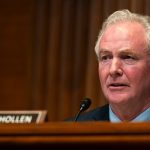Despite a sharp, Trump-directed reversal in federal support for electric vehicles, a multibillion-dollar investment from Ford Motor Co. in Kentucky may indicate that the industry, and the commonwealth, plan to stay the course.
Ford Motor Co. announced a $5 billion investment in EV manufacturing Aug. 11, including modernizing the Louisville Assembly Plant for the production of a new midsize electric pickup truck on the company’s new Universal EV Platform. The plans mark Kentucky’s first major EV investment since the start of President Donald Trump’s second term, during which Biden-era policies designed to boost the industry have been largely dismantled.
The EV platform change is “the most radical change in how we design and how we build vehicles at Ford since the Model T,” CEO Jim Farley said. Ford “tore up the moving assembly line” at the Louisville Assembly Plant, he said, “and we came up with a brand new concept, a brand new vehicle and a better way of making a car.”
Ford’s retooling of the Louisville Assembly Plant is an investment in the “future of auto manufacturing,” said Gov. Andy Beshear, a stalwart advocate for bringing EV and battery manufacturing to Kentucky. He has often pitched the commonwealth as the “EV capital of the U.S.“
In recent years, the electric vehicle industry has announced $13.1 billion in Kentucky investments, according to Beshear. More than 2,200 roles were secured at the Louisville Assembly Plant through Ford’s announcement. The $5.8 billion BlueOval SK Battery Park in Hardin County is expected to create 5,000 jobs, and other projects are poised to yield thousands more.
These investments, many of which were made before Trump’s election, face political resistance. In July, the president’s domestic policy megabill triggered the phase out of tax credits for EV purchases, expected to slow demand. And unlike most states, Kentucky and its utilities have not enacted EV incentives, even as the industry spends billions of dollars to root an EV supply chain in the commonwealth.
During the announcement, Farley emphasized the plans are a “bet” — “that’s an intentional word, because there are no guarantees with this project,” he said. The investment is an apparent doubling down on electrification, even as the company’s EV division loses billions of dollars and political tailwinds die down.
Ford’s long-term EV strategy “can’t really count on administrations changing this way or that way,” Farley said during an earnings call last year. Building a new factory may take an automaker more time than the length of a presidential term.
The company’s recent investment in EVs is among others from automakers, showing “there really is a market need, a market demand, and products that make sense,” said David Cooke, senior associate director of the Center for Automotive Research at Ohio State University.
With recent incentive rollbacks, Ford and other companies are facing greater pressure to produce EVs that are competitive with gas-powered vehicles — federal incentives or not.
“What all the companies are saying is, ‘We’re moving forward with our plans, because these things make sense. We’ve made multibillion-dollar investments. We’re seeing really good products come out of it. So now we have to shift our strategy,'” Cooke said.
Ford investment comes as EV incentives are torn away
Biden-era policies such as the Inflation Reduction Act laid much of the groundwork for the electric vehicle industry’s progress in recent years.
Consumers saw thousands of dollars in tax credits for buying U.S.-made EVs; states received billions of dollars to build out charging infrastructure; and battery manufacturers received generous federal loans and other subsidies. Sales of electric and hybrid vehicles grew substantially.
Key pieces of these EV-boosting provisions went through a shredder when Congress passed the One Big Beautiful Bill Act in early July. Especially detrimental to demand was the rollback of tax credits for new and used electric vehicles ― consumer-side subsidies which effectively lowered the price of many EVs by thousands of dollars, and will now expire at the end of September.
The Trump administration is also working to claw back funding for electric vehicle charging infrastructure, withholding $2.4 billion, including more than $32 million earmarked for projects in Kentucky. Beshear joined a lawsuit in his official capacity, alongside numerous other states, to unfreeze the funding, which was appropriated by Congress in the Bipartisan Infrastructure Law of 2021.
“Electric and hybrid vehicles are no longer the technology of the future,” Beshear said in a statement, criticizing the withheld charging infrastructure funds. “They’re here now, and this technology is only becoming more important to our families and businesses.”
The Republican supermajority in the Kentucky General Assembly has shown little interest in backing clean energy technology for the sake of reducing emissions. But GOP leaders have celebrated the big-ticket investments of the EV industry as job creators.
Senate President Robert Stivers, R-Manchester, said Ford’s plans represent “an investment in our state’s economic engine and in Kentucky’s future,” and attributed the investment to the state’s “pro-growth policies and an all-of-the-above energy strategy,” according to a statement.
He also nodded to other recent announcements — including a $2.5 billion investment from Apple in Harrodsburg, and a $1.5 billion uranium enrichment project slated for Paducah. The state’s “conducive climate” for business, Stivers said, is formed “in collaboration with federal policy reforms.”
Still, the commonwealth’s consumer-side policies currently offer little support to the EV industry. Kentucky is one of only three states where neither the legislature nor local utilities offer incentives for purchasing an electric vehicle, according to a Kelley Blue Book analysis.
And Kentucky law largely prohibits direct-to-consumer sales models, like those of EV makers Tesla and Rivian, although companies have found some workarounds.
Nationally, the electric vehicle industry, previously bolstered by federal incentives and grant programs, is facing a moment of truth: Can the market for EVs stand up on its own, without reliable federal support?
“The elimination of government-backed incentives and the emergence of new tariff headwinds signal a more volatile phase for the industry,” according to a recent analysis from Cox Automotive. “The training wheels are coming off, and the transition to electrification will no longer be buoyed by incentives alone.”
‘EVs are the best product’
Kentucky Gov. Andy Beshear, right, and Ford CEO Jim Farley shake hands during the announcement that the automaker plans to invest $5 billion and create roughly 4,000 jobs focused on EV production across the Louisville Assembly Plant and the BlueOval Battery Park in Michigan.
The industry’s bet on EVs, regardless of federal support, rests on whether automakers can make electric vehicles competitive with gas-powered vehicles, both in cost and capability. Farley tried to make the case with Ford’s forthcoming midsize electric pickup truck, to be built at the Louisville Assembly Plant.
“It will be faster than our Mustang twin turbo,” Farley said. “…It will have amazing range. It can power your house for six days. You don’t need a generator, you just buy this truck. And we’re going to start the vehicle at $30,000” — below the starting price of a new midsize Ford Ranger pickup.
Despite its optimism for the future of EVs, Ford is losing money on them. The company reported a loss of $1.3 billion in the second quarter on its EV unit, and announced a further delay in the production of two EV products to 2028.
The broader U.S. market is bracing for more pain. In the first half of 2025, EV sales hit a record 607,089, according to Cox, but sales were down slightly in the second quarter year-over-year. Industry analysts expect a spike in EV sales ahead of the consumer tax credit’s sunset, “followed by a collapse” in the fourth quarter, Cox predicted, “as the electric vehicle market adjusts to its new reality.”
But Ford leaders say continued, forward-looking investment in EVs is a necessary bet to remain competitive, especially as automakers face mounting pressure from Chinese companies, which have made leaps in EV technology and continue to storm the global market.
And the industry is optimistic that EV prices will fall as the technology improves and production scales. Ford’s announcement revealed how the automaker plans to make its manufacturing process more efficient.
Fewer parts, fewer welds, the removal of 4,000 feet of wiring and other changes in Ford’s new process are meant to make production easier and faster, executives said. Farley repeatedly made comparisons to the Model T, a pioneer of assembly line mass production credited with making automobiles accessible to the general public.

Ford Motor Company workers at the Louisville Assembly Plant Monday morning, August, 11, 2025 where the giant auto and truck manufacturer announced plans to invest $5 billion and create roughly 4,000 jobs focused on EV production across the Louisville Assembly Plant and the BlueOval Battery Park in Michigan. The company touted the EV investment will create a new production line with a more comfortable work environment.
Ford believes “EVs are the best product, by far, for the customers we’re going after,” said Doug Field, the company’s chief of EVs and digital design.
Electric Vehicles typically involve much lower maintenance costs, since they have far fewer parts, and are often cheaper to fuel, depending on gasoline and electricity prices.
Metro Council member Betsy Ruhe, a Democrat whose district includes the Louisville Assembly Plant, drives a Chevy EV. She bought it for its efficiency, environmental benefits and easy upkeep, she said. “Even though that vehicle might cost you more upfront, it costs so much less to own. It’s a good investment.”
As electric vehicle investment continues to grow, Ruhe said she does not “anticipate all of that being derailed despite the goings on in Washington,” but emphasized the need for continued efforts to make charging accessible.
For many consumers, EVs’ lower cost of ownership could be overshadowed by a higher sticker price relative to internal combustion. Canceled incentives could slow down the industry’s growth, but experts say electrification efforts seem poised to press on.
“I think the world over the last few years is really starting to understand that this isn’t just a climate and environmental goal,” Cooke said. “It’s a right product for the right mission goal.”
More: Kentucky faces identity crisis as conservatives both criticize and support EV industry
Connor Giffin is an environmental reporter at The Courier Journal. Reach him directly at cgiffin@courier-journal.com or on X @byconnorgiffin. Reach reporter Lucas Aulbach at laulbach@courier-journal.com.
This article originally appeared on Louisville Courier Journal: Ford EV truck investment in Kentucky as federal support dwindles









